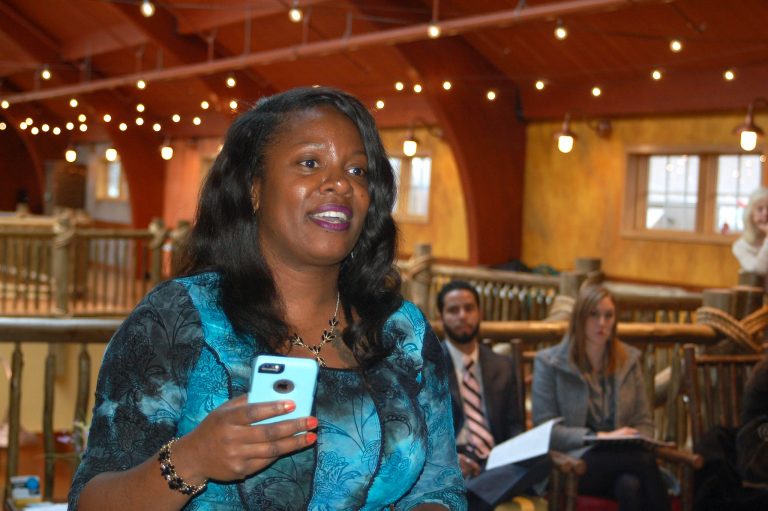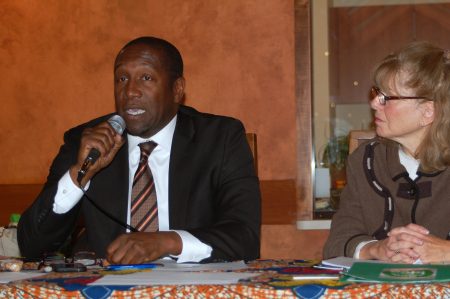Entrepreneurs Pitch Ideas At Conference
St. Ann’s Center’s north-side campus provides incubator for possible start-up businesses.

Ms. Clean Cleaning Service owner Nakita Deberry, seeking funding to expand her business, makes her pitch at the St. Ann Center business incubator. Photo by Andrea Waxman.
For Yvonne Echols, being an entrepreneur is not so much about being a business owner as it is about building a legacy for her children. Having worked since age 14, most recently as a bank manager, Echols began thinking about how her years of hard work and missed time with her children weren’t adding up to something she could pass on to them.
“You can’t leave a job to your children,” Echols said, noting that, in general, African -Americans haven’t had opportunities to accumulate wealth to pass down the generations as other groups have. So, two years ago, she gave her employer notice that she was giving up her position to strike out on her own.
Echols was one of a dozen entrepreneurs who pitched business ideas to a room full of professional advisors, owners, lenders and city officials at a recent business incubator hosted by St. Ann Center for Intergenerational Care at its North Side Bucyrus Campus. In addition to the opportunity to present, attendees heard from three panels of experts who responded to their presentations and offered advice on financing, marketing, branding and other basics of building successful businesses. Participants were also given time to speak with panelists one-on-one and collect information at resource tables.
Echols and her business partner Marvin Jones, a Kendall College culinary arts- trained chef and caterer, hope to purchase and redesign a building across from St. Ann Center at North Avenue and 23rd Street. They plan to develop it into a professional shared kitchen center that will support mobile food businesses such as food trucks and caterers, which need such facilities for food preparation and storage to get licensed. In addition to seven kitchenettes, Echols and Jones would construct, service and provide parking for food trucks and carts, open a street-level cafe and offer food safety training, Echols said.

Tracy Meeks, senior vice president at Seaway Bank, speaks to entrepreneurs as Kiva representative Barbara Markoff looks on. Photo by Andrea Waxman.
The business, called Mwanga wa Kwanza (First Light Initiative in Swahili), will need substantial funding to redevelop the building and purchase state-of-the-art equipment. Echols and Jones hope that their goal of supporting other entrepreneurs in the community will help them attract financial help.
It was helpful to listen to other entrepreneurs’ ideas at the incubator, as well as to practice her pitch and learn about funding sources, Echols noted.
Like many entrepreneurs building a business from the ground up, presenter Sheneta Hamilton is employed at a full-time job. A Milwaukee native and mother of two, she recently moved to the Northwest Side but aspires to open an Afro-centric apparel and accessory store in the Bronzeville neighborhood. Hamilton started selling T-shirts with a domestic violence awareness theme three-and-a-half years ago but changed to African-inspired merchandise.
“I am African-American,” Hamilton explained. “It’s a culture thing for me.”
For about two years, Hamilton has built her business, Mahogany Expressions, out of her home, filling orders from her Facebook page and selling at local festivals.
Hamilton was particularly interested in the lending resources discussed at the incubator event and plans to look into getting a zero-interest loan from Kiva, an international nonprofit that was represented on a panel.
Barbara Markoff, a Kiva volunteer with extensive bank community development experience, explained that Kiva, an online lending platform, is “a first-rung lender.” Unlike traditional lenders, Kiva does not require a business plan, credit score or Social Security number to help entrepreneurs obtain loans. Rather, direct loans are approved through “social underwriting,” where trustworthiness is determined by friends and family lending a portion of the loan request, or by a Kiva-approved trustee vouching for the borrower.
Would-be borrowers must raise at least $25 from each of a certain number of acquaintances within two weeks. After that, Kiva makes its worldwide crowd-funding lender network available and the borrower has 30 days to raise the money to meet its goal.
“The bottom line is that lenders need to judge that the business will be in a position to repay a loan… It needs to have revenue and an account containing funds,” said Markoff, who added that some presenters appeared to be in such a position while others were just in the idea stage. Markoff commended the incubator sponsors for providing entrepreneurs with an opportunity to learn by presenting their ideas informally.
Panelist Tracy Meeks, senior vice president at Seaway Bank, echoed other panelists when he said he would like to see more detailed financial statements with the presentations.
“They need to carefully think through their budgets and the financial dimensions of what they are trying to accomplish so they can take advantage of available resources,” Markoff noted. “I would encourage them to look at a variety of (funding) opportunities simultaneously,” she added.
Panelist Ranell Washington, assistant vice president of commercial banking at Town Bank, agreed “there were several people with some very good ideas, who are at different stages of development.”
He advised entrepreneurs to find mentors in their industry. They should also make sure to take advantage of free resources available from the chambers of commerce, business organizations, universities, city government and banks. “They should build a book of resources. We have more resources than entrepreneurs right now. We need more entrepreneurs,” Washington said.
Markoff noted that Wisconsin Women’s Business Initiative Corporation (WWBIC) provides clients with a business coach who will see them through the start-up process and offers low- or no-cost classes.
The recent event was the second St. Ann Center has hosted this year to help businesses start up and expand in the 53205 and 53206 ZIP codes. Adopting the theme “Building from Within,” the center, Alderman Russell Stamper II and the North Avenue Marketplace Business Improvement District (BID) 32 planned the incubator. Two business incubators per year are planned at the Bucyrus Campus, 2450 W. North Ave.
“In general, all (of the entrepreneurs) were genuine and had enthusiasm in what they were presenting and in their business ideas,” said Meeks. Business owners need to believe in their business, and make others believe in it, he added.
This story was originally published by Milwaukee Neighborhood News Service, where you can find other stories reporting on fifteen city neighborhoods in Milwaukee.






















The best idea they could’ve come up with is…
leave Wisconsin.